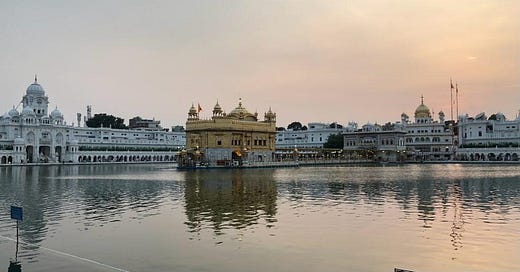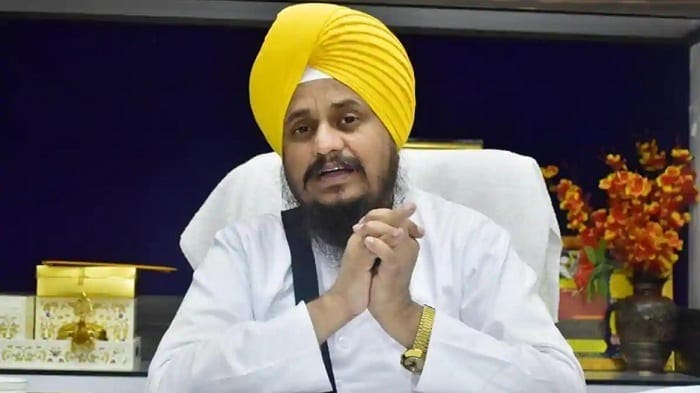Shiromani Akali Dal Concedes Defeat by a Virtual Walkover in Punjab Vidhan Sabha By-Elections
If a party with a century-old legacy—born out of the struggle to free Sikh Gurdwaras from corrupt mahants—were to fade away, it would be a profound loss not just for Sikhs but for Punjab as a whole.
Virtual Walkover by Shiromani Akali Dal in the Four By-Elections
The Election Commission of India has scheduled by-elections for four significant assembly constituencies in Punjab—Dera Baba Nanak, Chabbewal (SC), Gidderbaha, and Barnala—to be held on November 13, 2024. These by-polls were necessitated due to the election of sitting MLAs to Parliament during the 2024 Lok Sabha elections. As Punjab heads toward the next Vidhan Sabha elections in 2027, these by-elections have become a crucial litmus test for gauging public sentiment on the ruling Aam Aadmi Party (AAP) government, which has been in power since 2022. The by-election notification was issued on October 18, 2024, with the nomination process closing on October 25 (today), scrutiny on October 28, and the final withdrawal date being October 30. The election code of conduct is in effect across the concerned districts of Gurdaspur, Hoshiarpur, Sri Muktsar Sahib, and Barnala and will remain in force until November 25, 2024, after the results are declared on November 23.
Political Landscape and Contesting Parties
In a sharply contested political environment, the Congress Party and AAP have moved swiftly to announce their candidates for these key by-elections. Both parties are treating these by-elections as critical battlegrounds. However, in a surprising turn of events, the Shiromani Akali Dal (SAD), under the leadership of the embattled Sukhbir Singh Badal, has chosen not to field candidates, opting out of the electoral race entirely. This decision comes at a crucial moment when SAD is grappling with internal challenges and facing pressure from the Akal Takht after Sukhbir Badal was declared a "tankhaiya" and is awaiting formal punishment for his religious transgressions.
Impact on Congress and AAP
For the Congress Party, which held the seats of Dera Baba Nanak and Gidderbaha prior to the Lok Sabha elections, these by-elections carry significant importance. The seats are now being contested by the wives of the former MLAs—now Members of Parliament—Sukhjinder Singh Randhawa and Raja Warring. The party views this as not only a test of its electoral strength but also a matter of prestige for its local leadership. A strong showing in these by-elections will reinforce Congress’s status as the primary opposition force in Punjab, arguably improving its chances of returning to power in 2027
For AAP, the by-elections offer an opportunity to consolidate its dominance. AAP swept the 2022 Punjab elections, securing an overwhelming majority of 92 out of 117 seats. These by-elections, however, come after more than two years of governance, and they will serve as a crucial barometer of public satisfaction with the party’s performance. AAP is keen to prove that its appeal remains intact as it moves toward the 2027 general elections. A victory here— particularly wresting the seats previously held by Congress— would affirm that the party’s governance model has sustained public support.
BJP's Strategic Calculations
The Bharatiya Janata Party (BJP), historically a minor player in Punjab politics, is using these by-elections to explore new opportunities for growth, especially in rural areas traditionally dominated— till the recent years— by the Shiromani Akali Dal (SAD). The BJP is fielding candidates from the Jat Sikh community, aiming to fill the void left by SAD’s absence and hoping to attract voters who previously supported the Akali Dal. This strategic move indicates the BJP's desire to expand its influence in the state, particularly among rural voters who have long been resistant to the party's programmes and policies. Whether this tactic will yield electoral success remains uncertain, but the BJP’s participation signals its intention to become a serious contender in Punjab’s political landscape.
SAD’s Decision: A Strategic Blunder?
The Shiromani Akali Dal’s decision to abstain from these by-elections has raised eyebrows across Punjab’s political spectrum. By-elections are often viewed as opportunities for opposition parties to regain lost ground and to send a message of resilience to their base. In this context, SAD’s withdrawal is seen as a significant strategic misstep. The Gidderbaha constituency, long considered a Badal family stronghold, underscores the impact of this decision. Represented over the years by Parkash Singh Badal and his nephew Manpreet Badal, Gidderbaha has more than just a symbolic value for the party. By choosing not to contest, SAD appears to be ceding this vital ground without a fight, raising questions about its future strategy and political will.
1. No Formal Injunction from the Akal Takht
One of the critical aspects of SAD’s decision is the absence of any formal injunction from the Akal Takht that would prevent the party from contesting. While Sukhbir Singh Badal faces personal religious sanctions, these do not extend to the entire party. This makes SAD's choice to refrain from contesting all the more perplexing, as it appears to stem from internal party dynamics rather than external religious or political pressures. The Akal Takht’s directive only applies to Sukhbir Badal personally, leaving the door open for the party to participate, but it has chosen not to walk through it.
2. Missing an Electoral Test of Public Sentiment
With the Punjab Vidhan Sabha elections scheduled for February 2027, these by-elections are an important gauge of public opinion on AAP’s governance. Any credible opposition would view such elections as an essential opportunity to test the political waters, make a mark, and position themselves as viable alternatives. SAD's decision to stay out of the fray raises significant concerns about its leadership’s willingness to challenge the current government. By sitting on the sidelines, SAD risks being seen as either supportive of the status quo or incapable of presenting a coherent opposition to AAP.
3. Gidderbaha— Relinquishing Traditional Strongholds
The Gidderbaha constituency has long been a symbolic bastion for the Badal family, carefully nurtured over decades. The decision by Shiromani Akali Dal (SAD) to not contest here is particularly striking, as it indicates the party's reluctance to engage even in regions where it has strong historical roots. Ironically, the BJP candidate in Gidderbaha is Manpreet Badal, Sukhbir Singh Badal's first cousin, who is now contesting under the BJP banner—his fourth political affiliation in a varied career. By stepping aside, SAD has essentially conceded its traditional stronghold without a fight, a move that could have lasting consequences. This early withdrawal sends a signal to voters that SAD is either unwilling or unable to defend its legacy in constituencies where it once held sway.
4. Prestige Battle for Congress, Missed Opportunity for SAD
The by-elections in Gidderbaha and Dera Baba Nanak are a significant prestige battle for the Congress Party, whose former MLAs have ascended to Parliament as MPs. For Congress, these by-elections offer a crucial opportunity to prove that it can still challenge AAP's dominance in key constituencies. In contrast, SAD’s decision to withdraw from the race is a missed opportunity to re-establish itself as a serious political contender. Under the leadership of Parkash Singh Badal, SAD historically leveraged by-elections to make strong political statements, as seen in the Ajnala and Gidderbaha by-elections of the 1990s, which paved the way for its return to power in 1997. This time, however, SAD’s choice to sit on the sidelines reflects a lack of confidence in its ability to replicate those past successes.
5. Internal Challenges— SGPC President Election
The Shiromani Akali Dal (SAD) has been grappling with internal challenges for some time, as several prominent leaders have left to form splinter groups. This fragmentation has significantly weakened the party's standing, and its decision not to contest these by-elections only deepens the perception that SAD is in retreat. The by-elections could have been an opportunity for SAD to rally its factions and present a united front, but by opting out, it has further exposed its internal vulnerabilities. Adding to these challenges is the upcoming SGPC President election on 28 October, where the candidacy of rebel Akali leader and former SGPC President, Bibi Jagir Kaur, will serve as another critical test for Sukhbir Badal's leadership. If SAD fails to perform well in this contest, it risks intensifying the party's internal fractures, casting further doubt on its future unity and strength.
6. SGPC General Elections and Their Relevance
The upcoming SGPC (Shiromani Gurdwara Parbandhak Committee) general elections—set to take place after a 13-year hiatus—mark a crucial moment for SAD, which has traditionally held control over this influential body. The SGPC not only manages the historic Sikh Gurdwaras in Punjab, Chandigarh, and Himachal Pradesh but is also regarded as the apex democratic institution representing Sikhs worldwide. SAD's participation in these elections is crucial to maintaining its influence within the Sikh community. However, the party’s decision to abstain from the ongoing by-elections could weaken its position in the SGPC elections as well. A failure to retain its majority in the SGPC would likely signal the decline of Sukhbir Badal’s leadership, though the party, with its deep historical roots, may still endure in some capacity.
7. A Walkover Reflects Surrender, Not Strategy
By choosing not to contest these by-elections, the Shiromani Akali Dal (SAD) is essentially conceding a walkover, a move widely viewed as a political surrender. While not every electoral contest is fought with the expectation of immediate victory, participation is key to maintaining a party’s visibility, relevance, and credibility. SAD’s absence in these critical by-elections highlights a lack of political courage and resilience—traits that are vital for any party striving to stay in the public’s consciousness. Adding to this perception is the conspicuous silence and absence of Bikram Singh Majithia—a prominent party figure— from the public sphere as regards SAD affairs, despite his ongoing vocal opposition to the incumbent AAP government. This only reinforces the belief that SAD is in a state of disarray.
Summing Up and Looking Forward
The Shiromani Akali Dal's (SAD) decision to abstain from these crucial by-elections marks a significant inflexion point in Punjab's political landscape. While AAP and Congress prepare for a fierce contest, and even the BJP is poised to mount more than just a symbolic fight, SAD’s absence signals not merely a leadership in retreat but an outright capitulation. This raises serious concerns about the party’s future trajectory. The upcoming SGPC elections will provide further clarity on SAD’s standing, but for now, many view this withdrawal as a strategic misstep with potentially long-lasting consequences. With the SGPC President election on 28 October and the Vidhan Sabha by-election results due on November 23, 2024, after polling on November 13, it remains uncertain whether SAD can recover from this self-imposed setback or if it will continue to lose relevance in Punjab’s political arena. If a party with a century-old legacy—born out of the struggle to free Sikh Gurdwaras from corrupt mahants—were to fade away, it would be a profound loss not just for Sikhs but for Punjab as a whole.






